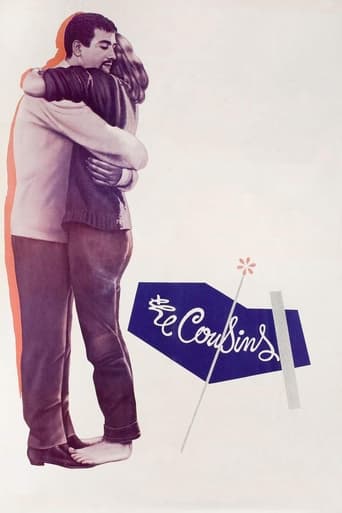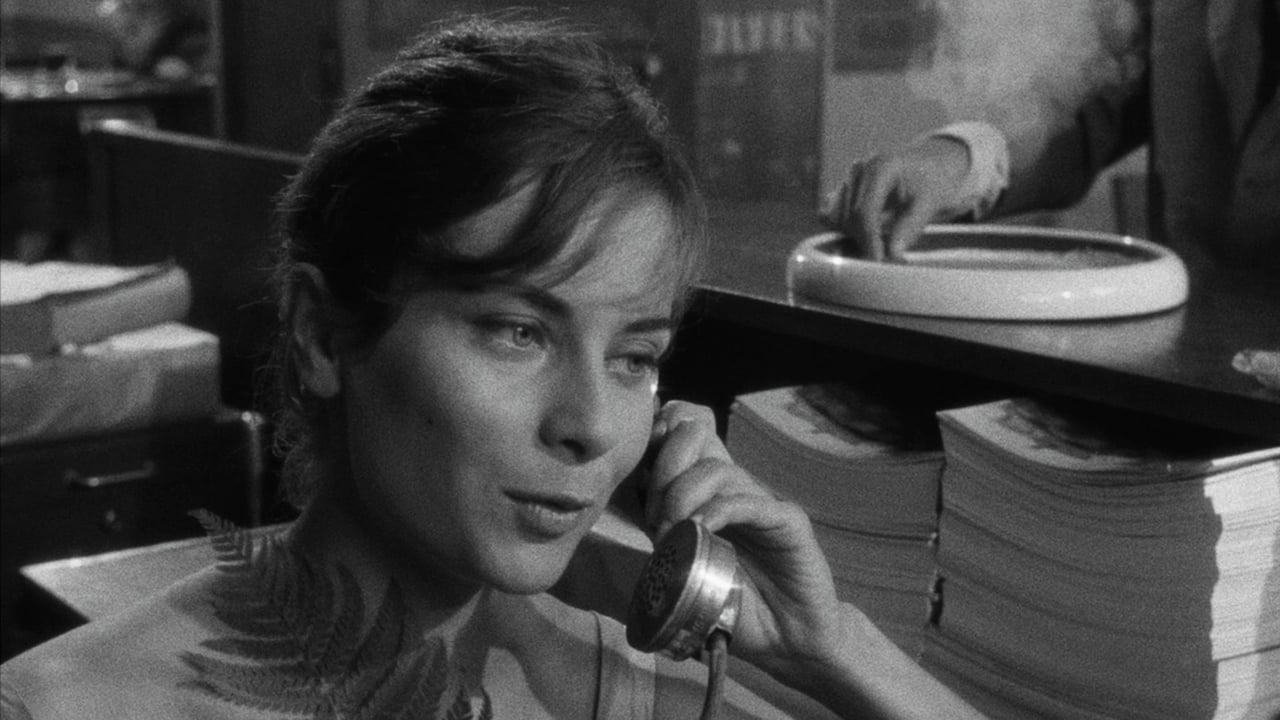antoniocasaca123
The 13th film I saw of Claude Chabrol. The least I liked. I understand the meaning and the message of the film, but practically nothing captivated me: Neither the characters (nor Charles's own character captivated me) nor the rhythm of the film (a very long sequence in which we get to know Paul's friends, who swim and the way the "bourgeoisie" is presented to us, there are immense films that "capture" this social class in a much more skilful and humorous way, nor the message of the film, which I find to be inadequate and unlikely in the form how it is performed. I liked Chabrol's film the previous year, his first one, "le beau serge", curiously with the same double protagonist. I can not give this "les cousins" more than 6/10.
Antonius Block
This movie by French New Wave filmmaker Claude Chabrol has a pretty simple plot, but was enjoyable nonetheless. In a nutshell, Charles, an innocent and earnest young law student, moves to Paris from the provinces to live with Paul, his sophisticated, profligate cousin. He's immediately exposed to the party life, which is both wild (there is a lot of flirting and bottle smashing) and somewhat amusing (the young men are all in suits and ties, play Bridge in bars, and listen to Mozart and Wagner at parties). He falls for Florence, a woman who's been around, and while she wants to have a meaningful relationship, she's convinced by Paul and another friend that she'll find him boring. She ends up with Paul instead, and moves in with the two of them. Charles actually takes it quite well, sharing meals with them and doing his best to ignore them, for example, as they shower together. He gets a free book and great advice from a bookseller (study hard, and "Read Dostoyevsky - he addresses all your concerns!"), who was naturally my favorite character :). Exams loom, and while Charles tries to apply himself, Paul parties on. I won't spoil it any more than I already have.This was one of those old movies that was anything but boring. The New Wave movement had as its aim to make movies that were different in content and style, and this succeeds; it's quite edgy for its time, and Chabrol has some great shot sequences here. Seeing it really transported me to the Latin Quarter in 1959 Paris.
alberts322
Why is this moving and provoking movie never seen? It never seems to get any notice or mention when discussing or reviewing New Wave films. Better than the "400 Blows" and most of the rest of the genre. Could the score have something to do with this. Does Wagner have such an effect on viewers?
jameswtravers
Les Cousins is definitively part of the French New Wave of the late 1950s. Whilst slightly more polished than the films of his contemporaries (notably Godard and Truffaut), Chabrol's film bubbles with an insurgence of new cinematographic techniques and fresh acting talent. The sense of newness is reinforced by presence of so many young actors, dressed elegantly in tuxedos and evening dresses, but acting somewhat delinquently for the most part. The film appears almost like the christening party for the birth of a new era in French cinema.Both the direction and photography are of a high calibre and capture very well the changing mood of the central character, Charles. The film starts cheerfully and optimistically with the young man's arrival in Paris. Like him, we are enchanted by the bright lights, the wide boulevards and the historic monuments. But then, little by little, the mood changes to ennui and disappointment when the shallowness of the Paris jet set is revealed. Finally, a much darker mood prevails as Charles' best efforts to succeed are brutally crushed by a combination of circumstances, partly of his own making but largely as a result of the hand of fate. This ability to alter the mood of the film so subtly and effectively is one of Chabrol's great skills as a director and is used to far greater effect in some of his subsequent thrillers.Both of the two central characters, Charles and Paul, are played admirably by Gérard Blain and Jean-Claude Brialy. Blain manages to capture the innocence of the outsider and offers a sympathetic and memorable performance. Brialy seems to revel in his role as the extravagant city student, hosting his parties with the gusto of a true bon-vivant, whilst exhibiting a more complicated and sensitive persona in his conversations with the characters Charles and Florence.Both actors were used by Chabrol in an earlier film, Le Beau Serge, which, in some ways, is the mirror image of Les Cousins. In Le Beau Serge, Brialy played a city boy who returns to his home in a provincial town where he met up wih a childhood friend played by Blain. Brialy's character was the outsider and ultimately he was destroyed by his alien surroundings. In Les Cousins, the situation is cleverly reversed. Here, Blain's character is a country boy who joins Brialy in the city of Paris. It is Blain's character who is now the outsider, and who is finally destroyed by his unfamiliar environment. It is interesting to watch the two films back-to-back, to note the similarities and compare the differences. Both films seem to side with the outsider and condemn the society that rejects him, although it is perhaps disappointing that, in both cases, that the outsider is destroyed without having any significant impact on the society that crushed him. At least, in Le Beau Serge, the victim's fate was sealed by an altruistic desire to do some good for the community that rejected him, whereas in Les Cousins, the victim brought his destruction on himself by trying to attack the society he felt so repulsive.Les Cousins lacks the emotional intensity of Le Beau Serge and appears in some places a little too stage-managed. (The ending is particularly stagy, but it works perfectly to the film's advantage.) On the plus side, Les Cousins benefits from a far superior musical score, a more interesting set of characters, and some impressive location filming in Paris. It is an engaging and accessible film which still appears fresh and vibrant.


 AD
AD



